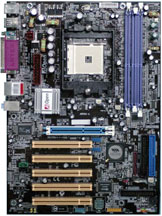Thermaltake XaserV Damier V6000A
by Purav Sanghani on July 22, 2004 3:21 PM EST- Posted in
- Cases/Cooling/PSUs
Benchmarking
When benchmarking the V6000A, we test the temperatures of key components including the actual CPU temperature, the actual temperature inside the heatsink, the temperatures of the DDR, Northbridge, Southbridge, HDD, PSU, and the ambient temperature inside the case all during normal operation. For a system to operate efficiently, the components need to stay at a specified temperature to avoid system crashes, or worse, hardware damage. A well-designed case should have an air flow system that is effective in keeping the hottest running components at a constant and stable temperature for optimal performance. During our testing, the PSU and CPU heatsink fans remained on to measure temperatures during normal system operations.AOpen AK86-L |
We took temperature readings of the components at 10 and 30 minutes of system operation time. In the previous articles, we included results of the two most recent cases that were reviewed. However, in light of our change in test bed, we will start a new board.
| Thermaltake Damier V6000A | |||||||||
| System On-Time | CPU | Heatsink | HDD | DDR | Northbridge | Southbridge | Power Supply | System Ambient | |
| 10 | 35.2 | 21.6 | 29.1 | 29.1 | 33.5 | 27.1 | 23.8 | 23.2 | |
| 30 | 43.6 | 28.4 | 30.2 | 30.1 | 33.9 | 28.4 | 26.4 | 25.8 | |
The results show that the Athlon64 3200 runs a few degrees hotter than our previous test bed's Athlon MP 2100+. Our results show that the CPU was kept at a stable operating temperature, at 43.6 degrees, which is about 54 degrees Celsius below the Athlon 64 3200's maximum recommended operating temperature.
Though cooling is a major factor in choosing a good case, noise levels also affect the overall quality of the product. We test the noise level of the V6000A about 12" from the sealed case with the power supply and CPU fans turned off to reproduce the noise of the case alone. Since our test bed power supply and CPU heatsink fan were turned off, we were able to compare the Damier to the results of previous cases that we have tested.
| Case | dBA |
| Thermaltake Damier V6000A | 53 |
| Super Flower X-Mask | 51 |
| Lian Li PC-V1000 | 46 |
| Opus Technologies MT-200 | 56 |
| Thermaltake Xaser III Skull VM3000A | 55 |
Though the V6000A had five fans, it was much quieter than the VM3000A, which had only four fans. Thermaltake decided to use variable speed fans with the V6000A as well as various models of fans, which all had different output ratings, instead of using all equally powerful fans throughout the chassis. This variance in output produced less noise, since only certain fans were required to operate at higher speeds than the others.











16 Comments
View All Comments
Operandi - Thursday, July 22, 2004 - link
I agree with the above comments, it's becoming pretty clear that this isn't the type of case your target audience is looking for.skiboysteve - Thursday, July 22, 2004 - link
"Our results show that the CPU was kept at a stable operating temperature, at 56.2 degrees, which is about 40 degrees Celsius below the Athlon 64 3200's maximum recommended operating temperature.""System On-Time CPU
30 43.6"
What??
skiboysteve - Thursday, July 22, 2004 - link
i have the 3000a and I love it to death, although i have to agree, there are way too many wires. I did a great job hiding them though so the window looks good.Pollock - Thursday, July 22, 2004 - link
No, #1, check some of the previous case reviews here; there ARE uglier things. Several of them.TrogdorJW - Thursday, July 22, 2004 - link
I have to agree. Sure, it's big and roomy. It also scream, "I LOVE THERMALTAKE!" Personally, I would rather make a different kind of statement with my case.You know what someone needs to do? Create a case with pre-installed fans and wires, with a separate power unit (a very small one should suffice) to provide all of the fans and other devices with power. They could build the system with all the fans installed and still keep the majority of wires hidden away. And they should use 120mm fans spinning at lower RPMs. *That* would be something to spend $160 on!
Spend $160 on this monstrosity? Ugh. If you need big, there are better options. If you want silent, there are MUCH better options. If you want bright lights and gawdy flash, however, this case fits the bill. I'm sure there are a bunch of teenagers out there that think this case looks totally l33t. They're welcome to it, I suppose.
JKing76 - Thursday, July 22, 2004 - link
That is truely the ugliest thing I have ever seen.